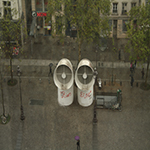Euroacademia Conferences
 Europe Inside-Out: Europe and Europeanness Exposed to Plural Observers (9th Edition) April 24 - 25, 2020
Europe Inside-Out: Europe and Europeanness Exposed to Plural Observers (9th Edition) April 24 - 25, 2020 Identities and Identifications: Politicized Uses of Collective Identities (9th Edition) June 12 - 13, 2020
Identities and Identifications: Politicized Uses of Collective Identities (9th Edition) June 12 - 13, 2020 8th Forum of Critical Studies: Asking Big Questions Again January 24 - 25, 2020
8th Forum of Critical Studies: Asking Big Questions Again January 24 - 25, 2020 Re-Inventing Eastern Europe (7th Edition) December 13 - 14, 2019
Re-Inventing Eastern Europe (7th Edition) December 13 - 14, 2019 The European Union and the Politicization of Europe (8th Edition) October 25 - 26, 2019
The European Union and the Politicization of Europe (8th Edition) October 25 - 26, 2019 Identities and Identifications: Politicized Uses of Collective Identities (8th Edition) June 28 - 29, 2019
Identities and Identifications: Politicized Uses of Collective Identities (8th Edition) June 28 - 29, 2019 The European Union and the Politicization of Europe (7th Edition) January 25 - 26, 2019
The European Union and the Politicization of Europe (7th Edition) January 25 - 26, 2019 7th Forum of Critical Studies: Asking Big Questions Again November 23 - 24, 2018
7th Forum of Critical Studies: Asking Big Questions Again November 23 - 24, 2018 Europe Inside-Out: Europe and Europeanness Exposed to Plural Observers (8th Edition) September 28 - 30, 2018
Europe Inside-Out: Europe and Europeanness Exposed to Plural Observers (8th Edition) September 28 - 30, 2018 Identities and Identifications: Politicized Uses of Collective Identities (7th Edition) June 14 - 15, 2018
Identities and Identifications: Politicized Uses of Collective Identities (7th Edition) June 14 - 15, 2018
Conservative Identity Politics Identity and Transformation in Ernst Jünger’s Postwar Writings
-
-

-
Presentation speakers
- André Fischer, Department of German Studies, Stanford University
Abstract:
The catastrophe of the First World War shattered numerous European national identities and led to various compensatory narratives that aimed to restore a sense of unity and belonging, forging the fiction of nationhood. Within the German context, probably few other figures reflect the cultural impact of this search for identity more diversely than philosopher and writer Ernst Jünger, particularly in regards to narrating nationhood. In his poetic and essayistic output, he probed several roles in order to model new forms of national identity and elitist belonging. From the figure of the warrior in his famous diaries from World War I to the Gestalt of the worker in the interwar politics of the conservative revolution and the Wehrmacht conspiracy against Hitler, Jünger reinvented types of individual agency through the reflection of dynamic historical events. His stylization as anarchic solitaire shifting from one totalitarian state towards another is part of a flexible authorial politics by means of which the author aims to sustain his suprahistorical perspective by sensibly responding to the historical shifts of which he is a part. „I do not contradict myself – this is a temporal prejudice. I move through the different layers of truth, the highest of which always subjects the others.” His credo as a writer and thinker marks the will to unite the diverse experiences under several political systems into a new model of identity. This paper examines how through the constant reinvention of authorial types, Jünger’s prose unfolds as an inbetween of reflecting historical facts and inventing collective identities – to retrace modern convergence of history and literature, a reading of Jünger is most compelling.
-
Related Presentations

Who Can Erase the Traces?
- Fortunata Calabro

Teshigahara Hiroshi - Filmmaker of the Japanese Collapsing Identity
- Maxime Boyer-Degoul
















